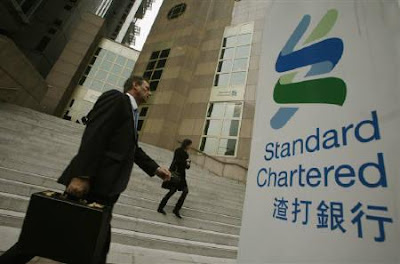Standard Chartered is looking to tap a bigger share of the acquisition-related financing in India, a senior executive said on Tuesday, as companies aggressively look for large buyout opportunities in the overseas markets.
But the Indian banking sector's margins will be squeezed as stiff competition among the global and local banks put pressure on pricing of corporate loans, V. Anantharaman, co-head for wholesale banking at Standard Chartered in India, said.
But demand for corporate credit will continue to grow as a volatile equity market in Asia's third largest economy makes it tougher for firms to raise funds through share sales, he said.
Standard Chartered, whose India operations account for the biggest share of its profit, offers corporate financing and a range of other services including investment banking and trade finance in the wholesale banking segment.
"That's a huge area of growth. Lot of this financing will be dollar-linked financing and that does play to our strength," Anantharaman told Reuters in an interview, referring to the M&A financing.
"Having said that, it is not something which is open just for us. It is a very, very competitive market out there."
Standard Chartered, a commercial bank not scarred by the global financial crisis, is viewed by many rivals in India as the most aggressive packager of merger advice with its balance sheet.
The UK-based emerging markets specialist was lead adviser to Bharti Airtel in its $9 billion buy last year of Zain's Africa operations and provided about $1.5 billion in finance, the largest chunk.
It is also the joint lead adviser and part of a consortium that has agreed to lend about $3.5 billion to Vedanta Resources, a India-focused miner, to help pay for its planned $9.6 billion acquisition of oil and gas firm Cairn India.
India's Adani Enterprises earlier this month said it had agreed to buy Abbot Point Coal Terminal in Australia for $2 billion. The deal would be funded through debt, and Standard Chartered is the arranger.
Standard Chartered competes with its global rivals such as Citigroup, Barclays and HSBC as well as local banks including the State Bank of India and ICICI Bank for corporate banking services in India.
Standard Chartered's net interest margins for India business fell to 3.4 percent in 2010 from 3.8 percent a year ago. Income from wholesale banking in India rose 12 percent to $1.5 billion, bringing in 75 percent of total income of $2 billion.
EMERGING COMPANIES
Anantharaman said Standard Chartered was enhancing its focus on tapping India's "emerging companies" as they look to raise capital to expand their capacity and fund possible acquisitions in the overseas markets.
"We certainly continue to bank them (big companies) but we do need to look out for the next level of companies that are growing up, where there is a need for healthy mix of capital markets as well as banking solutions," he said.
The bank's impairment levels declined in 2010 as compared to a year earlier, Anantharaman said, adding the bank has not grown its corporate loan book "indiscriminately" and has a selective approach towards sectors like real estate.
The property industry in India has had a harder time attracting bank financing following a spate of scandals over the past year and worries about business practices in the thinly regulated sector.
Rising lending rates and volatile equity markets have also clouded the fund-raising outlook for developers, many of which -- including Emaar MGF and Lodha Developers -- have put their IPO plans on hold.
